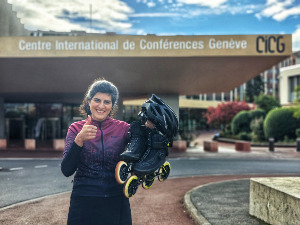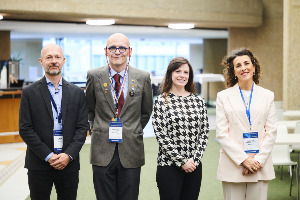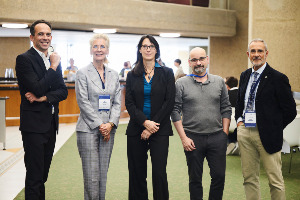|
Geneva, 10 October 2024 – Today was the third and final day of the 34th Alzheimer Europe Conference (#34AEC) “New horizons – Innovating for dementia”. The plenary sessions for this final day centred on the topics of “Intersectionality in dementia” and “Brain health and prevention”.
Intersectionality in dementia
 Plenary four opened the conference programme on this final day, and comprised four presentations revolving around the theme of intersectionality. It was chaired by Maria do Rosário Zincke dos Reis (Portugal). She opened the session, introducing first a short video, before the presentations. The video summarised the journey of dementia researcher Golnaz Atefi, who, during World Alzheimer’s Month this September, skated 1,026 km, setting the Guinness World Record for the farthest distance ever skated by a female. Golnaz Atefi said, of her journey: “I’m honoured to have accomplished this as part of the Rolling for Dementia campaign, raising awareness about dementia. My mission was to engage with professionals and community members across Europe, finishing at the Alzheimer Europe Conference, to highlight the critical need for inclusivity in dementia care and research.” Plenary four opened the conference programme on this final day, and comprised four presentations revolving around the theme of intersectionality. It was chaired by Maria do Rosário Zincke dos Reis (Portugal). She opened the session, introducing first a short video, before the presentations. The video summarised the journey of dementia researcher Golnaz Atefi, who, during World Alzheimer’s Month this September, skated 1,026 km, setting the Guinness World Record for the farthest distance ever skated by a female. Golnaz Atefi said, of her journey: “I’m honoured to have accomplished this as part of the Rolling for Dementia campaign, raising awareness about dementia. My mission was to engage with professionals and community members across Europe, finishing at the Alzheimer Europe Conference, to highlight the critical need for inclusivity in dementia care and research.”
Alzheimer Europe was pleased to support this amazing campaign, which was originally set to conclude in September, but due to overwhelming support, the “Rolling for Dementia” journey, both on and off skates, will continue and will run throughout Golnaz Atefi’s fellowship at University College London, continuing to collect and share insights about dementia. “I’m incredibly grateful to Alzheimer Europe for promoting inclusive dementia care, and I’m looking forward to both learning from and sharing the latest advancements in research during the conference”, she concluded. The video can be viewed, here: https://youtu.be/nJcHHTlJz4Y
 After this short video, the first speaker was welcomed to the stage. Antonella Santuccione Chadha, Founder of the Women’s Brain Foundation, Vice President of Euresearch, and former regulator and pharma executive, spoke about the importance of gender in dementia research, noting that Alzheimer's disproportionately affects women, both as patients and as caregivers. The Women's Brain Foundation is exploring how sex and gender impact the disease, with research showing that CDR-SB scores are higher when the informant is either female or a child, which, she pointed, out highlights the need to adjust clinical evaluations. After this short video, the first speaker was welcomed to the stage. Antonella Santuccione Chadha, Founder of the Women’s Brain Foundation, Vice President of Euresearch, and former regulator and pharma executive, spoke about the importance of gender in dementia research, noting that Alzheimer's disproportionately affects women, both as patients and as caregivers. The Women's Brain Foundation is exploring how sex and gender impact the disease, with research showing that CDR-SB scores are higher when the informant is either female or a child, which, she pointed, out highlights the need to adjust clinical evaluations.
The second speaker at this plenary session was T. Rune Nielsen, Associate Professor, PhD, Danish Dementia Research Centre, Copenhagen University Hospital & Department of Psychology, University of Copenhagen, Denmark. His talk was on reaching out to and including minority ethnic groups in dementia research. “Minority ethnic groups are not really hard to reach in dementia research, they just require a different mindset and approach from the researcher”, he began. He also highlighted the fact that most of the practices used to recruit and involve research participants frequently do not consider the diverse needs of minority ethnic groups, and said that “Researchers should be creative and flexible in their recruitment strategies, and consider various possible strategies before starting a project.”
Next to take the floor was John Angel Bond, from the LGBTQ+ Dementia Advisory Group at the University of Stirling, Scotland, United Kingdom. He introduced his presentation "Queering Up Dementia Care: The Next Steps" and stressed that this was very much a joint effort together with Mike Parish from the LGBTQ+ Dementia Advisory Group at the University of Stirling. Their presentation emphasised inclusivity, specialised care, and actionable change for LGBTQ+ individuals living with dementia. First, it highlighted that LGBTQ+ individuals form a significant yet often overlooked part of the dementia population. “They encounter unique challenges such as social isolation, lack of family support, and the lingering effects of past discrimination. Understanding and addressing these issues is crucial for providing dignified dementia care”, he said.
Secondly, the presentation stressed the importance of implementing inclusive practices in care environments, which, he said, “involves recognising chosen families, creating LGBTQ+ affirming spaces, and providing comprehensive staff training. Tailored care that respects gender identity and sexual orientation is essential.” Lastly, the presentation advocated for policy reforms, increased funding for LGBTQ+ support organisations, and regular inclusivity training. “These steps are essential to ensure that LGBTQ+ individuals living affected by dementia receive respectful and compassionate care as they navigate dementia, ultimately leading to an improvement in their quality of life”, he finished.
The final speaker was Eimear McGlinchey, Assistant Professor in Intellectual Disability, Trinity College Dublin, Ireland and Faculty at the Global Brain Health Institute. She discussed the link between Down syndrome and Alzheimer’s disease, explaining that virtually all individuals with Down syndrome develop Alzheimer's disease-related changes in the brain by age 40, and that Alzheimer’s has become the leading cause of death in this population. “These individuals experience a life expectancy more than 20 years shorter than the general population due to this disease”, she stated.
Speaking about the exclusion of Down syndrome from Alzheimer’s research, she said that “despite the overwhelming impact of Alzheimer’s disease on people with Down syndrome, they are often left out of crucial Alzheimer’s research, including clinical trials and post-diagnostic care initiatives. This lack of inclusion deepens existing healthcare inequities and limits access to important treatments.” She also highlighted the importance of advancing global inclusion in Alzheimer’s research, and said that “in order to reduce these inequities, it's vital to increase the inclusion of people with Down syndrome, particularly from low- and middle-income countries, in global Alzheimer’s disease initiatives. Addressing intersectional issues—such as race, geography, and socioeconomic status—is critical to providing equitable research, care, and support for this population.”
Parallel sessions and special symposia
Afterwards, attendees were invited to take their coffee break and an opportunity to view the many and varied poster presentations exhibited in the CICG conference centre foyer area. They then had the choice of nine parallel sessions, including one organised by our event co-hosts Alzheimer Switzerland which looked at remote/mobile care, another organised by INTERDEM and focusing on advance care planning, and one session with a series of quick oral presentations on the theme of brain health and prevention. There was also a parallel session about Public Involvement in dementia research.
Meanwhile, as part of a parallel session about “Campaigning for change”, Owen Miller, Policy Officer at Alzheimer Europe, discussed the importance of involving the dementia community in campaigning for change at a European level. He shared details of our EU campaign work in 2024, stemming from the Helsinki Manifesto - an outline of the current situation of dementia in Europe that details specific demands for the European Commission and national governments. This Manifesto was launched just prior to our Annual Conference in Helsinki last year and we have since used it as a campaigning tool around the European Parliament elections in June 2024 and have also launched a public Call to Action, which can be signed by individuals, here: https://bit.ly/AECallToAction2024. Find out more about the Helsinki Manifesto, including which organisations and entities have already endorsed it and how your organisation can go about supporting it, here: https://bit.ly/AEHelsinkiManifesto. Owen Miller was joined by Ilaria Mazzacane from Federazione Alzheimer Italia, who gave insights on how her organisation implemented the campaign at a national level in Italy, and Kevin Quaid, Chairperson of the European Working Group of People with Dementia, who highlighted how vital it was to include lived experience as part of this campaign.
After a short break, three further sessions took place simultaneously. Two of these were special symposia, one on “New dementia assistive technologies to transform lives: Presenting the innovators of the Longitude Prize on Dementia”, whilst the other, organised by Essity, delved into “Support for caregiving relatives in continence care”. The third session was a chance for delegates to view quick oral presentations on the theme of living with dementia.
After a lunch break, eight further parallel sessions were held, including one on end-of-life care, one on stigma and discrimination and another, organised by the eBRAIN-Health project, sought to advance our understanding of the brain and looked at developing personalised therapies for dementia and other neurodegenerative diseases. A final series of quick oral presentations looked at the area of detection and diagnosis, while Alzheimer Switzerland held a German language session called “Demensensible Gesellschaft – Beiträge von Alzheimer Schweiz” (“Dementia-sensitive society – contributions from Alzheimer Switzerland”).
Following a coffee break and a last opportunity to view poster presentations, the final plenary of the conference took place.
Brain health and prevention
 The fifth and final plenary session at the conference was on the topic of “Brain health and prevention” and was moderated by Giovanni Frisoni (Switzerland). Kicking off the session, the first speaker was Daniela S. Jopp, Professor of Psychology, whose work at the Institute of Psychology and LIVES Center of Competence on Life-span, University of Lausanne, focuses on adult development and ageing. In a presentation called “Healthy ageing – is it possible to escape dementia?”, she emphasised that dementia is not the “natural fate” of individuals reaching age 100. Indeed, the cognitive capacity of centenarians is very heterogenous, she said, ranging from high functioning to strong cognitive limitations. The fifth and final plenary session at the conference was on the topic of “Brain health and prevention” and was moderated by Giovanni Frisoni (Switzerland). Kicking off the session, the first speaker was Daniela S. Jopp, Professor of Psychology, whose work at the Institute of Psychology and LIVES Center of Competence on Life-span, University of Lausanne, focuses on adult development and ageing. In a presentation called “Healthy ageing – is it possible to escape dementia?”, she emphasised that dementia is not the “natural fate” of individuals reaching age 100. Indeed, the cognitive capacity of centenarians is very heterogenous, she said, ranging from high functioning to strong cognitive limitations.
The second speaker was Jean-Charles Lambert, PhD, Inserm Research Director, Head of the team "Search for molecular determinants of Alzheimer's disease and related disorders" at the Université de Lille, Institut Pasteur de Lille, France. His talk centred on the question “When does dementia become inescapable?” and explored the role of genetics. “Alzheimer's disease has a strong genetic component, and its characterisation is a major goal of Alzheimer's disease research in order to better understand the pathophysiological processes involved and to propose new therapeutic targets”, he highlighted. However, he also noted that *with the exception of the rare monogenic forms, for which a genetic council can be proposed, the use of this genetic information is not relevant at a clinical level for the common forms”, also mentioning that personalised medicine may be possible with the advent of immunotherapy.
Ira Haraldsen, MD, PhD, from the Department of Neurology at Oslo University Hospital, Norway spoke next, sharing results from the AI-Mind project, of which she is the coordinator. Regarding the potential of Artificial Intelligence (AI) to enhance early dementia detection, she stated that “Artificial intelligence enables more accurate risk prediction by integrating diverse data sources, identifying patterns that are often missed by conventional methods.” She also emphasised, concerning proactive risk management, that AI “can predict dementia onset years before clinical symptoms appear, allowing for timely interventions and personalised care planning”. Finally, regarding some of the challenges and future directions, she said that “while promising, AI models must address ethical concerns around information without cure, data privacy, interpretability, and population-specific generalisability to ensure they are clinically viable and ethically sound”.
Finally, Bogdan Draganski, Professor at the Neurozentrum – Inselspital, University of Bern, Switzerland, discussed new preventative approaches for vascular dementia. Vascular dementia is a very common, but under-investigated brain health problem associated with increasing age, he began. “There are several cognitive domains including planning, attention and emotional flexibility, that show deficits due to small vessel disease”, he continued, also pointing out that the condition can remain undetected until verified using brain imaging techniques.
“There is close interrelation between some forms of vascular dementia and cerebral amyloid angiopathy, which is common in patients with Alzheimer’s disease showing a prevalence of 50%. The most common symptoms leading to diagnosis are related to spontaneous brain haemorrhages”, he said. In closing, he also highlighted that the appearance of the “so-called white matter hyperintensities” in brain imaging should be taken seriously. “Efficient and consequent treatment of cardio- and cerebro-vascular risk factors, especially in the middle age can prevent the progression of vascular dementia”, he concluded.
Innovation in dementia care Au revoir Genève, auf Wiedersehen Genf, arrivederci Ginevra ... E buongiorno Bologna!
 The closing ceremony of the conference included comments from Maria do Rosário Zincke dos Reis, in her capacity as our Chairperson. She took the opportunity to thank all of the delegates and speakers “for making these three days such a fantastic time by sharing experiences and knowledge from different perspectives as people with dementia, carers, researchers, healthcare and social professionals. Different perspectives but with a common goal: To improve the quality of life of people with dementia and carers.” She also thanked all of our corporate sponsors, including gold sponsor Lilly, silver sponsors Biogen, Novo Nordisk, Otsuka and Terumo and bronze sponsors BioArctic, Bristol Myers Squibb, MSD, Prothena and Roche. Finally, she said a huge thanks to the Alzheimer Europe team for all the hard work in making the conference happen and to our co-hosts Alzheimer Switzerland. The closing ceremony of the conference included comments from Maria do Rosário Zincke dos Reis, in her capacity as our Chairperson. She took the opportunity to thank all of the delegates and speakers “for making these three days such a fantastic time by sharing experiences and knowledge from different perspectives as people with dementia, carers, researchers, healthcare and social professionals. Different perspectives but with a common goal: To improve the quality of life of people with dementia and carers.” She also thanked all of our corporate sponsors, including gold sponsor Lilly, silver sponsors Biogen, Novo Nordisk, Otsuka and Terumo and bronze sponsors BioArctic, Bristol Myers Squibb, MSD, Prothena and Roche. Finally, she said a huge thanks to the Alzheimer Europe team for all the hard work in making the conference happen and to our co-hosts Alzheimer Switzerland.
Hans Stöckli, President of Alzheimer Switzerland expressed gratitude for the support provided by Swiss partners and especially the CICG conference centre for providing us with free rental and audiovisual support. He also gave a big thanks to the Swiss institutional speakers who spoke at the opening ceremony on Tuesday and finally, thanked the translators and all the local staff for their help and support.
Mario Possenti, Secretary General of Federazione Alzheimer Italia, then took to the stage to invite delegates to the 35th Alzheimer Europe Conference, “Connecting science and communities: The future of dementia care”, taking place in Bologna, Italy, from 6 - 8 October 2025. Save the dates!
A short video, introducing Bologna as our next host location, was shown.
You can view it, here: https://www.youtube.com/watch?si=Nqv58pGnpy6ivKtT&v=oghB0JVyP7I&feature=youtu.be
Alzheimer Europe would like to thank all delegates who joined us as #34AEC, and we hope to see next year for #35AEC in Bologna!
Acknowledgement
Alzheimer Europe gratefully acknowledges the support of all conference sponsors, with particular thanks to Gold sponsor Lilly, Silver sponsors Biogen, Novo Nordisk, Otsuka, and Terumo, and Bronze sponsors, BioArctic, Bristol Myers Squibb, MSD, Prothena and Roche.
For further information, contact:
Jean Georges, Executive Director, Alzheimer Europe, 5, Heienhaff, L-1736 Luxembourg, Tel.: +352-29 79 70, Fax: +352-29 79 72, jean.georges@alzheimer-europe.org, www.alzheimer-europe.org
Notes to editors:
Alzheimer Europe is the umbrella organisation of national Alzheimer associations and currently has 41 member organisations in 36 European countries.
The European Working Group of People with Dementia (EWGPWD) was launched by Alzheimer Europe in 2012. It is composed entirely of people with dementia, nominated by their national Alzheimer associations. They work to ensure that the activities of Alzheimer Europe reflect the priorities and views of people with dementia. The group operates independently and the Chairperson is also an ex-officio member on the Board of Alzheimer Europe with full voting rights. (/www.alzheimer-europe.org/Alzheimer-Europe/Who-we-are/European-Working-Group-of-People-with-Dementia)
INTERDEM is a pan-European network of researchers collaborating in research on and dissemination of Early, Timely and Quality Psychosocial Interventions in Dementia aimed at improving the quality of life of people with dementia and their supporters, across Europe (http://interdem.org/).
The eBRAIN-Health project is developing a secure research platform for “digital twins” of the brain. The project has received funding from the European Union’s Horizon Europe research and innovation programme under grant agreement no. 101058516. (https://www.ebrain-health.eu/)
The AI-Mind project is a 5-year, EU-funded Horizon 2020 project that brings together 15 partners from 8 countries, including academic institutions, medical centers, SMEs and patient associations. The AI-MIND project has received funding from the European Union’s Horizon 2020 research and innovation programme under grant agreement No 964220. (https://www.ai-mind.eu/) |